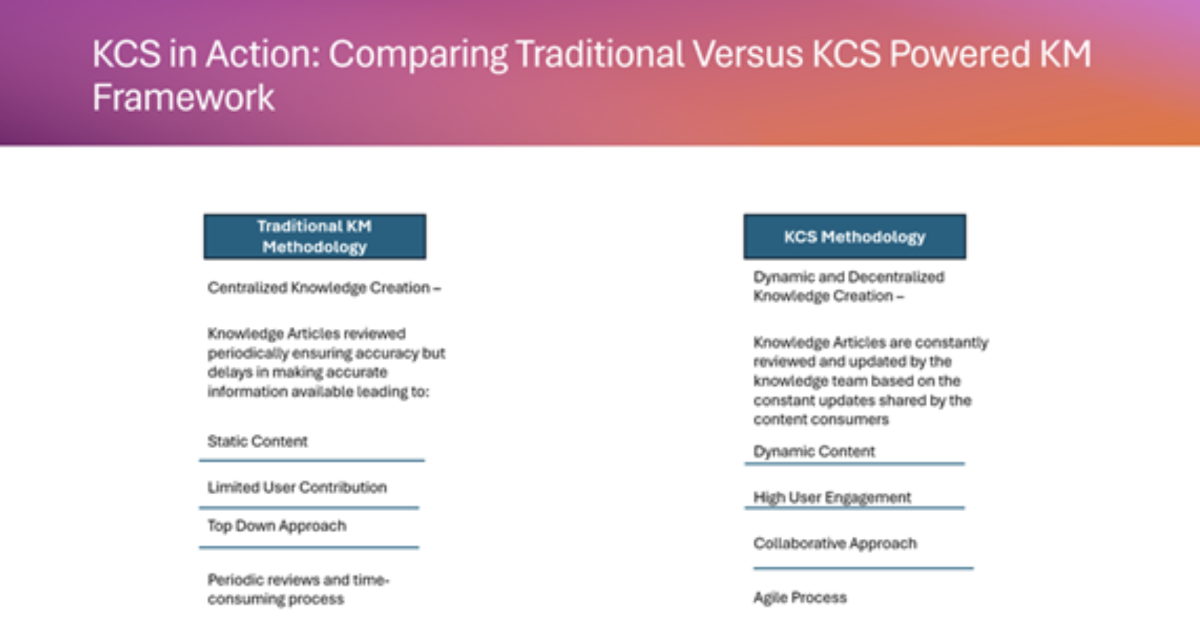 ...
...
How would you like to be a Guest Blogger for KMI? Email us at: info@kminstitute.org and let us know your topic(s)!
KCS in Action for a Sustainable and Successful KM Practice
 KCS is based on the continuous improvement process. It is the most in-demand and revered approach for setting up a KM practice due to its many-to-many model that leverages the employees’ collective experience across the organization versus the traditional KM system that follows a few-to-many approach while setting up the framework.
KCS is based on the continuous improvement process. It is the most in-demand and revered approach for setting up a KM practice due to its many-to-many model that leverages the employees’ collective experience across the organization versus the traditional KM system that follows a few-to-many approach while setting up the framework.
What makes KCS truly relevant and practical is that it is demand-driven, ie, the knowledge repository is set and continuously upgraded based on the recurrence of questions.
To illustrate the effectiveness of KCS versus the traditional KM model, let’s consider a hypothetical scenario involving a Tax Advisory team.
Tax cosultants who rely on up-to-date information to assist their clients cannot afford to work with outdated tax laws. Let’s explore how KCS and the traditional KM model would operate in providing updated and refreshed data to these consultants.
In the traditional KM model, a centralized team of tax experts creates and updates knowledge in the form of static documents, such as PDFs, which are then distributed to advisors. This top-down approach limits advisor input and results in long delays in updating knowledge, potentially leading to outdated advice.
In contrast, the KCS-based framework is decentralized and collaborative, allowing advisors to create and update knowledge in real time. This dynamic system encourages user engagement and agility and ensures that new information, such as changes in tax law, is shared and made available immediately. In this way, advisors can provide their clients with more up-to-date and comprehensive advice.

In the traditional framework, advisors must wait for the central team to analyze and distribute updates, which can lead to missed opportunities and outdated advice. In contrast, the KCS-based system allows advisors to document and share new information immediately, so they can provide the most up-to-date advice to their clients.
As discussed above, traditional knowledge management framework is slow and potentially outdated, while the KCS-based framework is fast and current.
By implementing the KCS approach, KM frameworks can effectively fulfil their primary objective of granting access to accurate and up-to-date content and knowledge.
By utilizing the KCS approach, service lines and offerings can streamline their processes and improve efficiency in delivering information to clients. This method not only ensures accuracy and relevance but also promotes a culture of collaboration and knowledge-sharing within the organization. As a result, clients can benefit from a more seamless and personalized experience, ultimately leading to increased satisfaction and trust in the advisory services provided.
Furthermore, integrating this approach with access to a network of Subject Matter Experts (SMEs) and content champions offers a comprehensive 360-degree solution and enhanced access to valuable resources.
To make your KM practice successful and sustainable is crucial to consistently evaluate, enhance, and refine your approach. A proactive mindset is essential for effective KM implementation, as opposed to a reactive one. By actively seeking opportunities for improvement and innovation within your KM practice, you can maximize its impact and value to your organization.
 Ekta Sachania has over 15 years of experience in learning and talent development disciplines, including knowledge management, content management, and learning & collaboration with expertise in content harvesting, practice enablement, metrics analysis, site management, collaboration activities, communications strategy and market trends analysis. Demonstrated success in managing multiple stakeholder expectations across time zones and exhibiting good project management skills, by successfully developing and deploying projects for large audiences. Ability to adapt and work in emerging areas with fast-shifting priorities. Connect with Ekta at LinkedIn...
Ekta Sachania has over 15 years of experience in learning and talent development disciplines, including knowledge management, content management, and learning & collaboration with expertise in content harvesting, practice enablement, metrics analysis, site management, collaboration activities, communications strategy and market trends analysis. Demonstrated success in managing multiple stakeholder expectations across time zones and exhibiting good project management skills, by successfully developing and deploying projects for large audiences. Ability to adapt and work in emerging areas with fast-shifting priorities. Connect with Ekta at LinkedIn...
Other Featured Blogs by Ekta:
Archives
- September 2018 (1)
- August 2018 (2)
- July 2018 (1)
- June 2018 (1)
- May 2018 (3)
- April 2018 (2)
- March 2018 (1)
- February 2018 (1)
- January 2018 (2)
- December 2017 (1)













